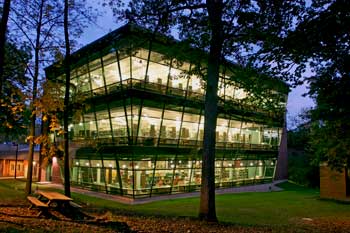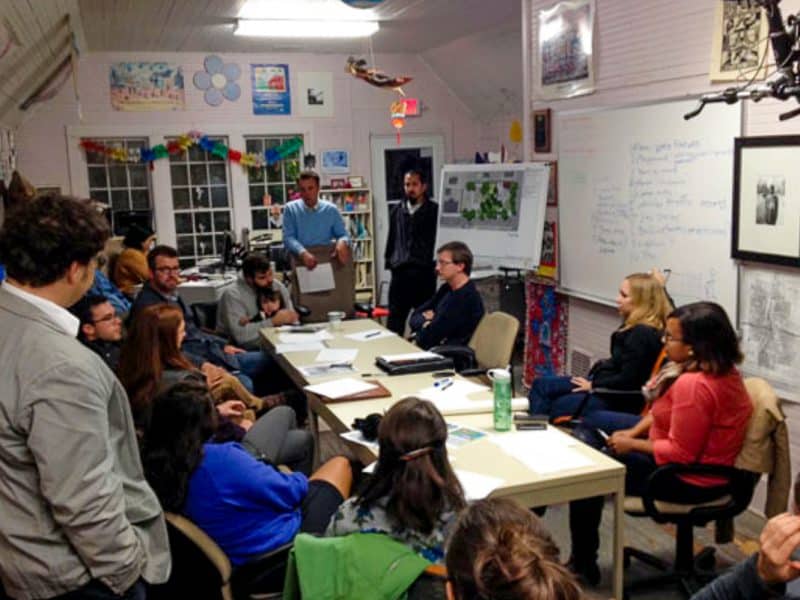The Entrepreneur’s Perspective
Dr. Stephen Forrest, the vice president of research at the University of Michigan, has a reasonable idea to revive the Midwest economy. Is anybody listening?
Stephen Forrest, the physicist known for pioneering the cutting edge optical technology used in flat screen televisions and other high tech visual displays, is one of the more accomplished entrepreneurs living in Michigan.
 Dr. Forrest has personally secured 155 patents. He’s helped found several companies, including Global Photonic Energy, which is developing a new generation of solar cells that can be applied like spray paint. And, as the vice president for research at the University of Michigan, Forrest oversees an operation of scientific exploration valued at more than $800 million in 2006. From a distance, the man even resembles Microsoft Founder Bill Gates.
Dr. Forrest has personally secured 155 patents. He’s helped found several companies, including Global Photonic Energy, which is developing a new generation of solar cells that can be applied like spray paint. And, as the vice president for research at the University of Michigan, Forrest oversees an operation of scientific exploration valued at more than $800 million in 2006. From a distance, the man even resembles Microsoft Founder Bill Gates.
So people listen when he talks about modernizing Michigan’s economy for the 21st century. And the Grand Angels, a group of investors based in the City of Holland that targets entrepreneurial startups in West Michigan, recently invited Dr. Forrest to make a presentation on the campus of Hope College. His charge was to tee up some ideas on what it will take to reverse the state’s extraordinary economic decline. Here’s the major – and sobering – point that led the speech:
“Manufacturing is no longer the economic driver of the Michigan or US economy,” said Dr. Forrest, a graduate of UC Berkeley and a former prof at Princeton. “Today, manufacturing is something like 11 or 12 percent of the GDP and it’s declining. The knowledge economy, which is around about 15 percent of the GDP and rising, is the new driver.”
All Hands On Deck
There is no denying or even minimizing the significance of the role that manufacturing played in regional – and national – growth, prosperity, and security throughout the past century. Even after decades of factory closings, bankruptcies, and job losses, heavy industry remains a crucial and evolving dimension of the Midwest and American economy.
But a growing number of Michigan’s brightest minds agree the regional marketplace is undergoing an intense and permanent transition from the Industrial Era to the Digital Age. The future, they say, is a knowledge-driven economy where sectors like design, alternative energy, info tech, and life science represent the new frontiers of opportunity much like steel and cars did one hundred years ago.
 With a rich history of innovation, Michigan cities are more than capable of competing successfully with Chicago, San Francisco, or Beijing in this emerging global market of ideas. The trouble is that the state currently is desperately poor when it comes to the basic prerequisites for change: imagination, leadership, openness, as well as a willingness to find common ground, pursue education, take risks, or significantly alter the status quo development strategy. That hard reality, Dr. Forrest said, is a mounting threat to the sustainability of Michigan’s economy, ecology, and way of life.
With a rich history of innovation, Michigan cities are more than capable of competing successfully with Chicago, San Francisco, or Beijing in this emerging global market of ideas. The trouble is that the state currently is desperately poor when it comes to the basic prerequisites for change: imagination, leadership, openness, as well as a willingness to find common ground, pursue education, take risks, or significantly alter the status quo development strategy. That hard reality, Dr. Forrest said, is a mounting threat to the sustainability of Michigan’s economy, ecology, and way of life.
“Michigan and the Great Lakes region are at a crossroads,” he said. “We can choose the past, which seems comfortable. But the industrial powerhouse that built the region is not suited to compete on the global scale. Failure to adapt will result in continued decline in prosperity, loss of population, and marginalization.”
“Or we can choose the future,” he continued, “which isn’t such a bold move because other places in this country have already chosen it.”
“Rapid transformation requires everybody to pull together – academia, industry, government, and philanthropy – and work as a team with the same vision to create an attractive region of knowledge and innovation where people from all over the country and world want to come to do business because they find it to be a naturally beautiful place with great cities.”
Innovative or Irrelevant But where to begin? At this point, setting the state on a prosperous course in the modern era demands everything from renegotiating union contracts and reigning in health care costs to cleaning up the Great Lakes and rebuilding astonishingly large tracts of land in disinvested central cities. Multi-billion dollar initiatives utterly necessary to boost future competitiveness lurk seemingly around every corner. Yet the politicians can’t get past the idea of tax cuts.
But where to begin? At this point, setting the state on a prosperous course in the modern era demands everything from renegotiating union contracts and reigning in health care costs to cleaning up the Great Lakes and rebuilding astonishingly large tracts of land in disinvested central cities. Multi-billion dollar initiatives utterly necessary to boost future competitiveness lurk seemingly around every corner. Yet the politicians can’t get past the idea of tax cuts.
Dr. Forrest hones in on several strategic initiatives to accelerate the economic transition. Aligning the statewide pay scale with the new economy is one important place to start. Manufacturing workers in Michigan, he says, earn $14,000 a year more than the rest of the nation. Meanwhile, knowledge workers make about $7,000 less. That is no way to attract the top talent necessary to play in the global economy.
Civic leaders, he said, also must focus more intensely on cultivating a culture of innovation. That means nurturing a society that’s open to new people and ideas. The vast majority of startup companies in Michigan over the past several years were launched by people who were not born in the United States, he said, so embracing diversity keys success.
It means leveraging the robust network of learning institutions like Hope College and Grand Valley State to reinvigorate the latent spirit of entrepreneurialism in young minds, grow the next generation of innovators, and spin-off profitable new ventures capable of competing globally.
If the companies founded by hyper creative MIT faculty and graduates formed an independent nation, Dr. Forrest said, the revenues generated by those companies would form the 24th largest economy in the world. Imagine what the combined economic impact of research universities like Michigan, Michigan State, and Wayne State might be given a more ambitious drive to translate ideas into marketable new products and services.
And, perhaps most importantly, Dr. Forrest argues that Michigan must put its money where its mouth is as it identifies promising strategies for change. The state, for instance, talks a big game when it comes to the importance of nurturing and attracting the creative class. But the recent trend is to continually slash education spending even as the overall state budget grows. That, he said, is a sure way to stifle the output of talented workers and erode the state’s competitive advantage in the Digital Age.
“The only solution to our economic problems is knowledge and innovation,” Dr. Forrest said. “That’s the bottom line.”
Andy Guy, the managing editor at Rapid Growth Media, is a journalist who lives in Grand Rapids. He’s also a project director at the Michigan Land Use Institute and authors a blog titled Great Lakes Guy.
Photos:
Dr. Stephen Forrest (photo courtesy of U of M)
The new library at Aquinas College
Aerial view of the riverfront
Photographs by Brian Kelly – All Rights Reserved








